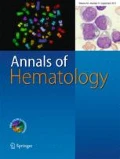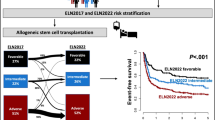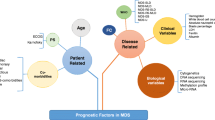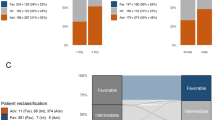Abstract
We integrated molecular data with available prognostic factors in patients undergoing allogeneic hematopoietic cell transplantation (alloHCT) for myelodysplastic syndrome (MDS) or secondary acute myeloid leukemia (sAML) from MDS to evaluate their impact on prognosis. Three hundred four patients were sequenced for mutations in 54 genes. We used a Cox multivariate model and competing risk analysis with internal and cross validation to identify factors prognostic of overall survival (OS), cumulative incidence of relapse (CIR), and non-relapse mortality (NRM). In multivariate analysis, mutated NRAS, U2AF1, IDH2, and TP53 and/or a complex karyotype were significant prognostic markers for OS besides age above 60 years, remission status, IPSS-R cytogenetic risk, HCT-CI > 2 and female donor sex. Mutated NRAS, IDH1, EZH2, and TP53 and/or a complex karyotype were genetic aberrations with prognostic impact on CIR. No molecular markers were associated with the risk of NRM. The inclusion of molecular information results in better risk prediction models for OS and CIR when assessed by the Akaike information criterion. Internal cross validation confirmed the robustness of our comprehensive risk model. In summary, we propose to combine molecular, cytogenetic, and patient- and transplantation-associated risk factors into a comprehensive risk model to provide personalized predictions of outcome after alloHCT.




Similar content being viewed by others
References
Komrokji RS (2016) Current state of the art: management of higher risk myelodysplastic syndromes. Clin Lymphoma Myeloma Leuk 16(Suppl):S39–S43
Malcovati L, Hellstrom-Lindberg E, Bowen D, Ades L, Cermak J, Del Canizo C et al (2013) Diagnosis and treatment of primary myelodysplastic syndromes in adults: recommendations from the European LeukemiaNet. Blood 122(17):2943–2964
Cutler CS, Lee SJ, Greenberg P, Deeg HJ, Perez WS, Anasetti C et al (2004) A decision analysis of allogeneic bone marrow transplantation for the myelodysplastic syndromes: delayed transplantation for low-risk myelodysplasia is associated with improved outcome. Blood 104(2):579–585
Koreth J, Pidala J, Perez WS, Deeg HJ, Garcia-Manero G, Malcovati L et al (2013) Role of reduced-intensity conditioning allogeneic hematopoietic stem-cell transplantation in older patients with de novo myelodysplastic syndromes: an international collaborative decision analysis. J Clin Oncol 31(21):2662–2670
Sorror ML, Maris MB, Storb R, Baron F, Sandmaier BM, Maloney DG et al (2005) Hematopoietic cell transplantation (HCT)-specific comorbidity index: a new tool for risk assessment before allogeneic HCT. Blood 106(8):2912–2919
Gratwohl A, Stern M, Brand R, Apperley J, Baldomero H, de Witte T et al (2009) Risk score for outcome after allogeneic hematopoietic stem cell transplantation: a retrospective analysis. Cancer 115(20):4715–4726
Haferlach T, Nagata Y, Grossmann V, Okuno Y, Bacher U, Nagae G et al (2014) Landscape of genetic lesions in 944 patients with myelodysplastic syndromes. Leukemia 28(2):241–247
Pellagatti A, Roy S, Di Genua C, Burns A, McGraw K, Valletta S et al (2016) Targeted resequencing analysis of 31 genes commonly mutated in myeloid disorders in serial samples from myelodysplastic syndrome patients showing disease progression. Leukemia 30(1):247–250
Schlenk RF, Dohner K, Krauter J, Frohling S, Corbacioglu A, Bullinger L et al (2008) Mutations and treatment outcome in cytogenetically normal acute myeloid leukemia. N Engl J Med 358(18):1909–1918
Bejar R, Stevenson KE, Caughey B, Lindsley RC, Mar BG, Stojanov P et al (2014) Somatic mutations predict poor outcome in patients with myelodysplastic syndrome after hematopoietic stem-cell transplantation. J Clin Oncol 32(25):2691–2698
Christopeit M, Badbaran A, Alawi M, Zabelina T, Zeck G, Wolschke C et al (2016) Correlation of somatic mutations with outcome after FLAMSA-busulfan sequential conditioning and allogeneic stem cell transplantation in patients with myelodysplastic syndromes. Eur J Haematol 97(3):288–296
Della Porta MG, Galli A, Bacigalupo A, Zibellini S, Bernardi M, Rizzo E et al (2016) Clinical effects of driver somatic mutations on the outcomes of patients with myelodysplastic syndromes treated with allogeneic hematopoietic stem-cell transplantation. J Clin Oncol
Thol F, Kolking B, Hollink IH, Damm F, van den Heuvel-Eibrink MM, Michel Zwaan C et al (2012) Analysis of NUP98/NSD1 translocations in adult AML and MDS patients. Leukemia 27(3):750–754
Mitelman F (1995) ISCN (1995): an international system for human cytogenetic nomenclature. S Karger, Basel
Thol F, Suchanek KJ, Koenecke C, Stadler M, Platzbecker U, Thiede C et al (2013) SETBP1 mutation analysis in 944 patients with MDS and AML. Leukemia 27(10):2072–2075
Thol F, Klesse S, Kohler L, Gabdoulline R, Kloos A, Liebich A, et al. Acute myeloid leukemia derived from lympho-myeloid clonal hematopoiesis. Leukemia 2017: Advance online publication
Korn EL (1986) Censoring distributions as a measure of follow-up in survival analysis. Stat Med 5(3):255–260
Gray RJ (1988) A class of K-sample tests for comparing the cumulative incidence of a competing risk. Ann Stat 16:1141–1154
Li KH, Raghunathan TE, Rubin DB (1991) Large-sample significance levels from multiply imputed data using moment-based statistics and an F reference distribution. J Am Stat Assoc 86:1065–1073
COX DR (1972) Regression models and life tables. J R Stat Soc B 34:187–202
Burnham KP, Anderson DR (2004) Multimodel inference: understanding AIC and BIC in model selection. Sociol Methods Res 33:261–304
Team RDC (2008) R: a language and environment for statistical computing
Papaemmanuil E, Gerstung M, Bullinger L, Gaidzik VI, Paschka P, Roberts ND et al (2016) Genomic classification and prognosis in acute myeloid leukemia. N Engl J Med 374(23):2209–2221
Koenecke C, Gohring G, de Wreede LC, van Biezen A, Scheid C, Volin L et al (2015) Impact of the revised International Prognostic Scoring System, cytogenetics and monosomal karyotype on outcome after allogeneic stem cell transplantation for myelodysplastic syndromes and secondary acute myeloid leukemia evolving from myelodysplastic syndromes: a retrospective multicenter study of the European Society of Blood and Marrow Transplantation. Haematologica 100(3):400–408
Deeg HJ, Scott BL, Fang M, Shulman HM, Gyurkocza B, Myerson D et al (2012) Five-group cytogenetic risk classification, monosomal karyotype, and outcome after hematopoietic cell transplantation for MDS or acute leukemia evolving from MDS. Blood 120(7):1398–1408
Della Porta MG, Alessandrino EP, Bacigalupo A, van Lint MT, Malcovati L, Pascutto C et al (2014) Predictive factors for the outcome of allogeneic transplantation in patients with MDS stratified according to the revised IPSS-R. Blood 123(15):2333–2342
Greenberg P, Cox C, LeBeau MM, Fenaux P, Morel P, Sanz G et al (1997) International scoring system for evaluating prognosis in myelodysplastic syndromes. Blood 89(6):2079–2088
Greenberg PL, Tuechler H, Schanz J, Sanz G, Garcia-Manero G, Sole F et al (2012) Revised international prognostic scoring system for myelodysplastic syndromes. Blood 120(12):2454–2465
Schanz J, Tuchler H, Sole F, Mallo M, Luno E, Cervera J et al (2012) New comprehensive cytogenetic scoring system for primary myelodysplastic syndromes (MDS) and oligoblastic acute myeloid leukemia after MDS derived from an international database merge. J Clin Oncol 30(8):820–829
Buccisano F, Maurillo L, Spagnoli A, Del Principe MI, Fraboni D, Panetta P et al (2010) Cytogenetic and molecular diagnostic characterization combined to postconsolidation minimal residual disease assessment by flow cytometry improves risk stratification in adult acute myeloid leukemia. Blood 116(13):2295–2303
Trottier BJ, Sachs Z, DeFor TE, Shune L, Dolan M, Weisdorf DJ et al (2016) Novel disease burden assessment predicts allogeneic transplantation outcomes in myelodysplastic syndrome. Bone Marrow Transplant 51(2):199–204
Hamilton BK, Visconte V, Jia X, Tabarroki A, Makishima H, Hasrouni E et al (2016) Impact of allogeneic hematopoietic cell transplant in patients with myeloid neoplasms carrying spliceosomal mutations. Am J Hematol 91(4):406–409
Lindsley RC, Saber W, Mar BG, Redd RA, Haagenson MD, Grauman PV, et al. (2016) Genetic alterations predict outcomes in patients with myelodysplastic syndrome receiving allogeneic hematopoietic stem cell transplantation. Blood : Abstrac #69
Crucitti L, Crocchiolo R, Toffalori C, Mazzi B, Greco R, Signori A et al (2015) Incidence, risk factors and clinical outcome of leukemia relapses with loss of the mismatched HLA after partially incompatible hematopoietic stem cell transplantation. Leukemia 29(5):1143–1152
Acknowledgements
We are indebted to all patients and contributing doctors. We thank Elke Dammann for the documentation of clinical data.
This study was supported by the German Federal Ministry of Education and Research grant 01EO0802 (IFB-Tx); grants 110284, 110287, 110292, and 70111267 from Deutsche Krebshilfe; grant DJCLS R13/14 from the Deutsche José Carreras Leukämie-Stiftung e.V; DFG grant HE 5240/5-2 and HE 5240/6-1; an ERC grant under the European Union’s Horizon 2020 research and innovation programme (No. 638035); and grants from Dieter-Schlag Stiftung.
Author information
Authors and Affiliations
Corresponding author
Ethics declarations
Conflict of interest
The authors declare that they have no conflict of interest.
Additional information
Christian Koenecke and Felicitas Thol share senior authorship.
Rights and permissions
About this article
Cite this article
Heuser, M., Gabdoulline, R., Löffeld, P. et al. Individual outcome prediction for myelodysplastic syndrome (MDS) and secondary acute myeloid leukemia from MDS after allogeneic hematopoietic cell transplantation. Ann Hematol 96, 1361–1372 (2017). https://doi.org/10.1007/s00277-017-3027-5
Received:
Accepted:
Published:
Issue Date:
DOI: https://doi.org/10.1007/s00277-017-3027-5




